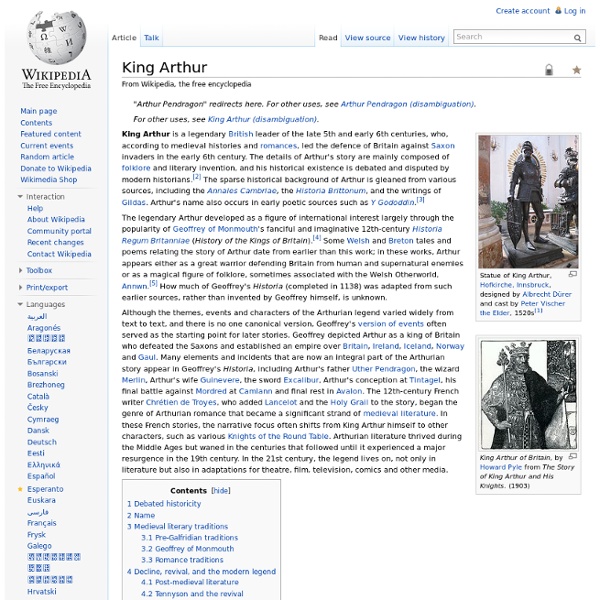



Round Table History[edit] Though the Round Table itself is not mentioned until Wace, the concept of Arthur having a marvelous court made up of many prominent warriors is much older. Geoffrey of Monmouth says that after establishing peace throughout Britain, Arthur "increased his personal entourage by inviting very distinguished men from far-distant kingdoms to join it."[3] The code of chivalry so important in later romance figures in as well, as Geoffrey says Arthur established "such a code of courtliness in his household that he inspired peoples living far away to imitate him. Later development[edit] The Round Table takes on new dimensions in the romances of the late 12th and early 13th century, where it becomes a symbol of the famed order of chivalry which flourishes under Arthur. The prose cycles of the 13th century, the Lancelot-Grail cycle and the Post-Vulgate Cycle, further adapt the chivalric attributes of the Round Table. Round Table tournaments[edit] Winchester Round Table Notes[edit]
Excalibur Excalibur is the legendary sword of King Arthur, sometimes attributed with magical powers or associated with the rightful sovereignty of Great Britain. Sometimes Excalibur and the Sword in the Stone (the proof of Arthur's lineage) are said to be the same weapon, but in most versions they are considered separate. The sword was associated with the Arthurian legend very early. Forms and etymologies[edit] Caledfwlch appears in several early Welsh works, including the poem Preiddeu Annwfn and the prose tale Culhwch and Olwen, a work associated with the Mabinogion and written perhaps around 1100. In Chretien de Troyes's Perceval, Gawain carries Escalibor and it is stated, "for at his belt hung Excalibor, the finest sword that there was, which sliced through iron as through wood"[4] ("Qu'il avoit cainte Escalibor, la meillor espee qui fust, qu'ele trenche fer come fust Excalibur and the Sword in the Stone[edit] History[edit] Caledfwlch in Wales[edit] Calesvol in Cornwall[edit] Attributes[edit]
Celtic Christian Spirituality Father Gorazd (Vorpatrny), a graduate of Holy Trinity Seminary in Jordanville, New York, completed his M.A. and doctoral degrees in theology at the Charles University in Prague, Czech Republic, where he is Senior Lecturer in Orthodox Studies at the Hussite Faculty of Theology. In 1996, the Charles University, the oldest university in Central Europe and the most prestigious educational institution in the Czech Republic, awarded Father Gorazd the B. Bolzano Prize for his Masters thesis, written on the Orthodox Church in Czechoslovakia from 1945-1951. THE ANCIENT CELTIC CHURCH had intimate ties with the same Desert Fathers of Egypt, Syria, and Palestine who fostered the ascetic literature and monasticism of the Byzantine and Slavic Orthodox Churches. This essay attempts to elucidate Celtic Christian spirituality and monasticism in the light of Orthodox Christian monastic and ascetic tradition. Introductory Remarks. The Origins of Monasticism in the West The influence of another monk, St.